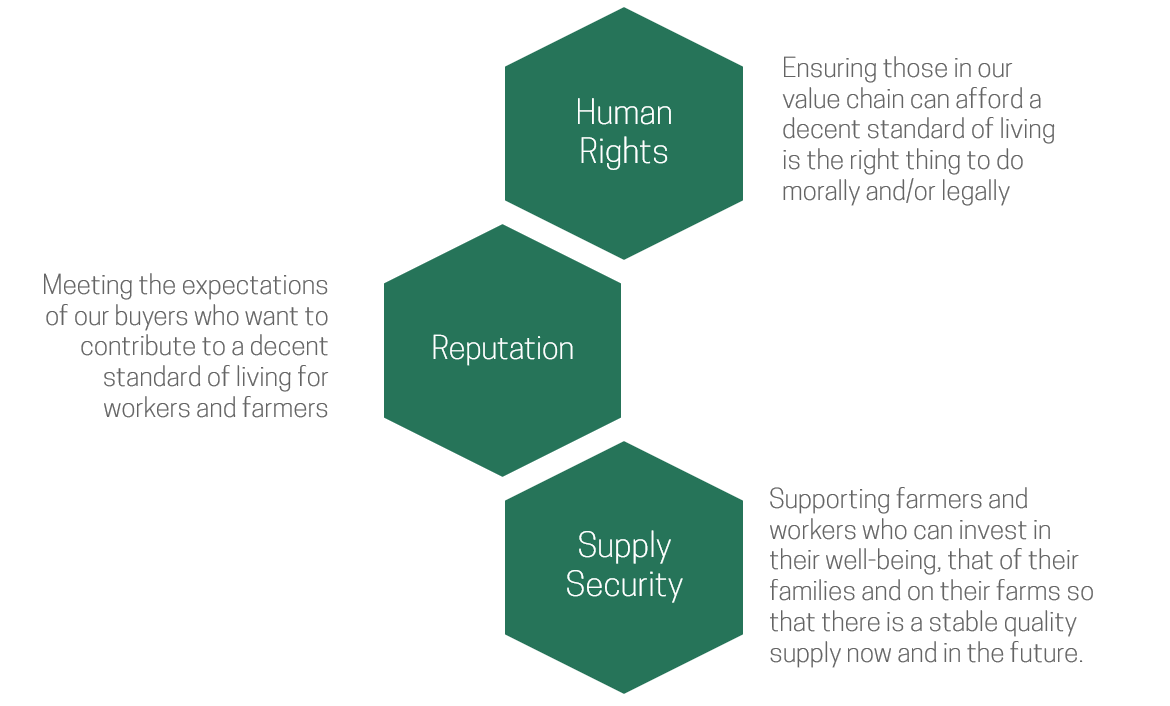Step 1: Build understanding 1.2 The business case
The way resources are used and the extent to which the benefits reach the marginalised millions at the far end of global supply chains is greatly influenced by companies and businesses. Paying a living wage or living income requires commitment and investment, but it can also result in tremendous benefits for a company. In addition, to ensuring compliance with international regulations on human rights and due diligence, implementing a living wage and living income strategy can help protect and build brand reputation. Adequately compensating workers and suppliers can also reduce long-term costs and help improve productivity and quality.
The topics of living wage and living income have exploded into the public consciousness. They are rooted in an aspiration to look beyond existing poverty lines and acknowledge the growing responsibility of governments, businesses and consumers in the agri-food sector. There are 3 principal lines of reasoning to consider incorporating living wages and living incomes into your supply chain sustainability and human rights approach.

Human Rights argument
Farmers and workers in producing countries are increasingly considered part of a company’s sphere of responsibility. This framing puts the focus on the company’s commitment to ensure that human rights are respected throughout their supply chain and in practice. This includes compliance with national human rights legislation or other international agreements, such as the United Nation’s Sustainable Development Goals.
The OECD Due Diligence Guidance for Responsible Business Conduct promotes a common understanding among governments and stakeholders on due diligence for responsible business conduct. The UN Guiding Principles on Business and Human Rights as well as the ILO Tripartite Declaration of Principles Concerning Multinational Enterprises and Social Policy also contain due diligence recommendations.
Reputation argument
As companies increasingly gain visibility in their supply chains, consumers and supply chain partners expect greater transparency and fair treatment of producer partners. Moreover, they are holding companies responsible for the problems occurring in their supply chains.
Civil society actors are increasingly building consumer movements to push for better treatment of workers and farmers. The Behind the Brands Scorecard from Oxfam assesses the agricultural sourcing policies of the world's 10 largest food and beverage companies.
Supply Security Argument
A living wage can lead to more satisfied and loyal workers. Adequate wages result in lower staff turnover and hiring costs. In addition, experienced workers can lead to improved productivity, reduction of defect rates and other quality improvements. Paying a living wage does not only translate to improved livelihoods, but also an improved business.
In the case of living income, it has become clear that farmers must be economically viable and that they need sufficient income to continually invest in and improve their farms. Not only in light of the effects of climate change, but low income represents a serious threat to both the quantity and quality of supply. Volatile and low prices are pushing farmers to leave their profession and few from the next generation are willing to continue farming.